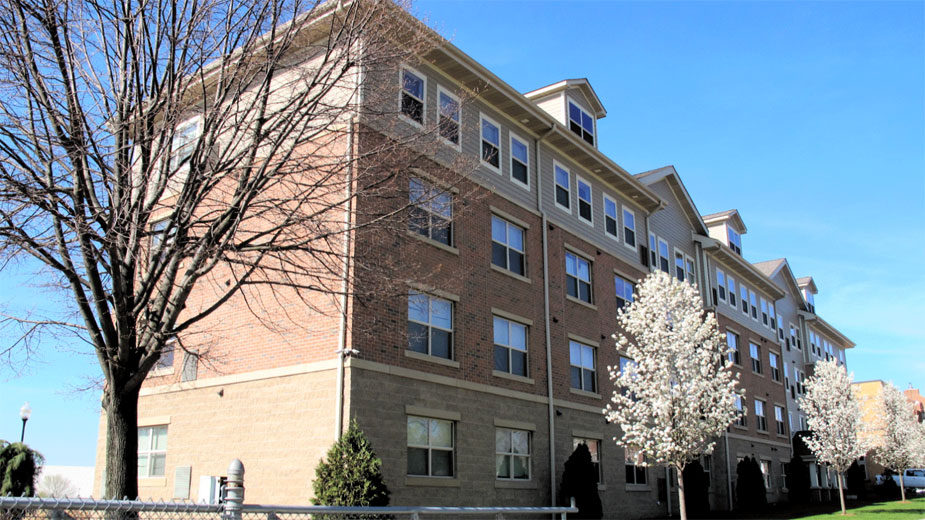Flats At Wick Files Counterclaim Against Bank
YOUNGSTOWN, Ohio – Court papers filed Thursday allege that the motive behind a foreclosure complaint filed April 15 against The Flats At Wick, a student housing development built in 2012, was the fact that its developer, Dominic Marchionda, is under criminal indictment.
The attorney representing Flats At Wick LLC filed a counterclaim in Mahoning County Common Pleas Court against the trustee of Morgan Stanley Bank, asking the court to dismiss a foreclosure action the bank filed against the company.
“Dominic has made all of his payments,” said Michael Pasternak of Dominic Marchionda, who in 2012 developed the student housing project at the corner of Elm Street and Madison Avenue near Youngstown State University. “The remedy they’re seeking is ridiculous.”
U.S. Bank National Association, as trustee for Morgan Stanley, filed documents April 15 seeking foreclosure on the property, alleging the business is in default of a $5.5 million loan it secured through the bank in December 2012.
The counterclaim states when Marchionda attempted to resolve the situation with the bank in October 2018, the bank informed Marchionda that the “real issue was that Mr. Marchionda had been indicted, and the bank ‘didn’t want this loan anymore.’ ”
Marchionda was first indicted in October 2017 on corruption charges, alleging he used public money intended for development projects for personal enrichment. In October 2018, the businessman’s case was incorporated with corruption charges brought against former Youngstown mayor Charles Sammarone and former Youngstown finance director David Bozanich.
Among the projects prosecutors have focused on is the Flats At Wick.
The 2018 indictment alleges the project’s contractor, whom sources confirm is Philip Beshara, former president of B&B Contractors & Developers Inc., met with Bozanich in 2009 at a local restaurant and paid him between $20,000 and $25,000 in return for Bozanich’s help in securing city support for Flats At Wick.
Initially, Bozanich was against providing any city help, but then changed his mind once the bribe was paid, the indictment says.
The city ultimately provided the project with a $1.2 million water grant and Marchionda used $1 million of that money to buy a city fire station on the property, with a balance of $200,000 kept by Marchionda, according to the indictment. Prosecutors allege that Marchionda used $70,000 of that money for his personal expenses.
All three men have pleaded not guilty.
Pasternak says the bank simply “wants to break the deal and get extra money on top of it. I don’t think it’s a justified case. What they’re looking for is not justified.”
Marchionda has kept Flats At Wick in excellent condition and has made all of the payments on time, the attorney adds.
“There’s no reason for these loan parties to go their separate ways,” Pasternak says. “He takes care of his properties. Often, when something like this happens, it’s either the payments aren’t being made or the property is run down. That’s not the case here.”
The counterclaim filed April 25 says Flats At Wick’s payments were made on time each month in accordance with the agreement. The company was to pay Morgan Stanley $31,961.56 on the first day of each month, beginning Feb. 1, 2013.
Under the agreement, Flats At Wick was to deposit the money into an operating account from which the payments would be automatically withdrawn, the counterclaim says.
But at some time during the first half of 2013, the bank informed Flats At Wick that it was now required to transmit the money via a series of transactions through a “lock box,” court papers say. Flats At Wick objected to this, since the new process would create additional transaction fees for the company, according to documents. Instead, Flats At Wick continued to deposit its payments in the regular fashion and the bank withdrew its money on time, the counterclaim said.
Flats At Wick continued to pay through this method for the next five years, and aside from an occasional reminder that the company had to pay via a lock box, the bank did not object to the manner that Flats At Wick made its payments, according to court papers.
It was not until April 2018, after more than five years of accepting monthly payments from the Flats At Wick, that the bank first communicated to the company “its method of making these monthly payments constituted default of the loan,” the counterclaim said. The bank also told Flats At Wick was required to pay it $135,000 to cure the default.
In September 2018, the bank informed Flats At Wick that it was in default, claiming Marchionda’s indictment as a factor, according to court papers.
“The indictment was not an event of default under the loan and the bank acted in bad faith in claiming that it was,” the counterclaim says.
In September 2018, Marchionda inquired about paying off the loan in full were he to secure additional financing, court papers say. In March, Marchionda obtained financing and offered to pay off the $4.7 million balance.
However, the counterclaim alleges that the bank informed Flats At Wick that it would owe an additional $498,752.42 in charges to pay off the loan.
“Notably, the bank’s records never showed this ‘fee’ as being owed prior to March 29, 2019, notwithstanding that the bank had claimed, for nearly a year, that Flats At Wick was in default,” court papers states.
Morgan Stanley says that as of April 1, the company owed the bank $4,754,311.70 in principle, $19,855.85 in accrued interest, $35,409 in property protection advances, $442,548 in default consideration, $700 in administrative fees, and $20,768.42 in legal fees.
The bank wants the court appoint a receiver to manage the operations of the apartment building. Morgan Stanley also demands judgment against the Flats at Wick for $5,202,681.65, all of the plaintiff’s costs and expenses, and all interest accruing after April 1 at a default rate of 9.85% per annum, or $1,300 per day.
In its counterclaim, Flats At Wick asks that the bank abide by the loan under the original terms of the agreement. It also seeks damages in excess of $100,000 for breach of contract, breach of the duty of good faith and fair dealing, tortious interference with business relations and abuse of process.
Copyright 2024 The Business Journal, Youngstown, Ohio.



